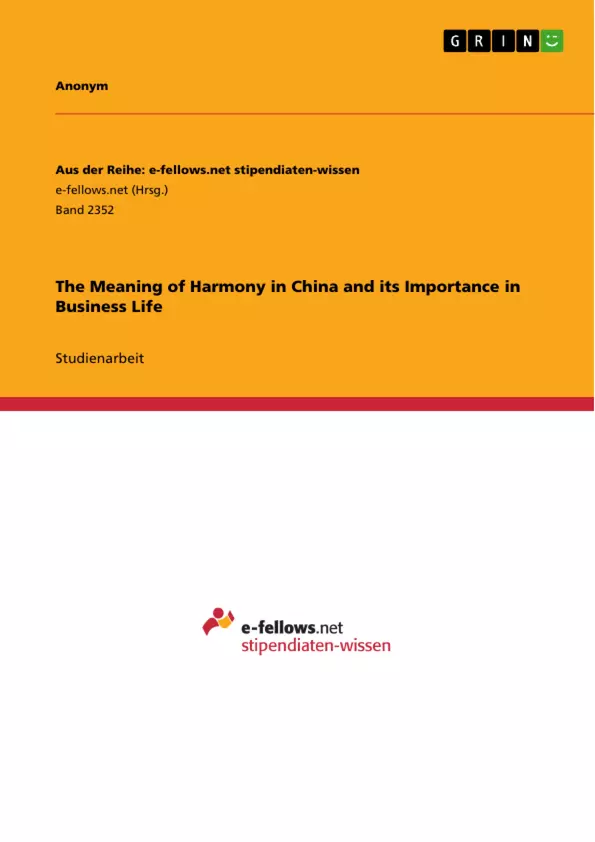The aim of this paper is to discss the importance of harmony in China in both social and business life. Therefore the concepts confuciasm, Taoism (Wuxing, Yin und Yang) and Mianzi and Guanxi are exmained. Furthermore a closer look will be given at Hofstede's cultural dimensions in relation to China. In terms of business behaviour in China the seating, behaviour during the dinner, drinking and toasting habits and do's and don'ts in dining will be discussed.
Table of contents
Abstract
Introduction
1 The Meaning and Core Principles of Harmony
2 Historical Symbols of Harmony
2.1 Confucianism
2.2 Taoism
2.2.1 Wuxing
2.2.2 Yin und Yáng
3 Harmony in Business
3.1 Mianzi
3.2 Guanxi
3.3 Other practices - gifts
4 Hofestede’S cultural dimensions
4.1 Individualism vs. Collecitivism
4.1.1 Task and relationship orientation - avoidance of conflict
4.1.2 Difference between communication with members of a group and outsiders
4.2 Power Distance
4.3 Masculinity/Femininity dimension
4.4 Uncertainty Avoidance
4.4.1 Neutral - Affective
4.4.2 Chinese modesty
4.5 Long term orientation
5 Advantages and Disadvantages of posting foreign professionals and managers
5.1 Advantages of posting foreign professionals/managers
5.2 Advantages of Chinese employees
5.3 Disadvantages of posting foreign professionals/managers
5.4 Disadvantages of Chinese employees
6 Training of Chinese employees
7 Dining etiquettes
7.1 Dress code and business cards
7.2 Seating
7.3 During the dinner
7.4 Drinking and toasting
7.5 Do’s and Don’ts in dining
7.5.1 Do’s
7.5.2 Don’ts
Conclusion
Bibliography
Frequently Asked Questions
What is the meaning of "Harmony" in Chinese culture?
Harmony is a core principle derived from Confucianism and Taoism, emphasizing balance, social order, and the avoidance of conflict in all aspects of life.
What are Mianzi and Guanxi in Chinese business?
"Mianzi" refers to "face" or social reputation, while "Guanxi" describes the essential network of personal and professional relationships needed for success.
What are the key dining etiquettes in China?
Important rules include specific seating arrangements based on hierarchy, traditional toasting habits, and several "do's and don'ts" regarding chopstick use and drinking.
How does Hofstede's cultural dimensions apply to China?
China is characterized by high collectivism, high power distance, and a strong long-term orientation, which significantly impacts management styles and communication.
Why is modesty important in Chinese business communication?
Modesty is a cultural virtue; being overly direct or boastful can cause others to "lose face" and disrupt the harmony of the group.
- Quote paper
- Anonym (Author), 2016, The Meaning of Harmony in China and its Importance in Business Life, Munich, GRIN Verlag, https://www.hausarbeiten.de/document/368354


